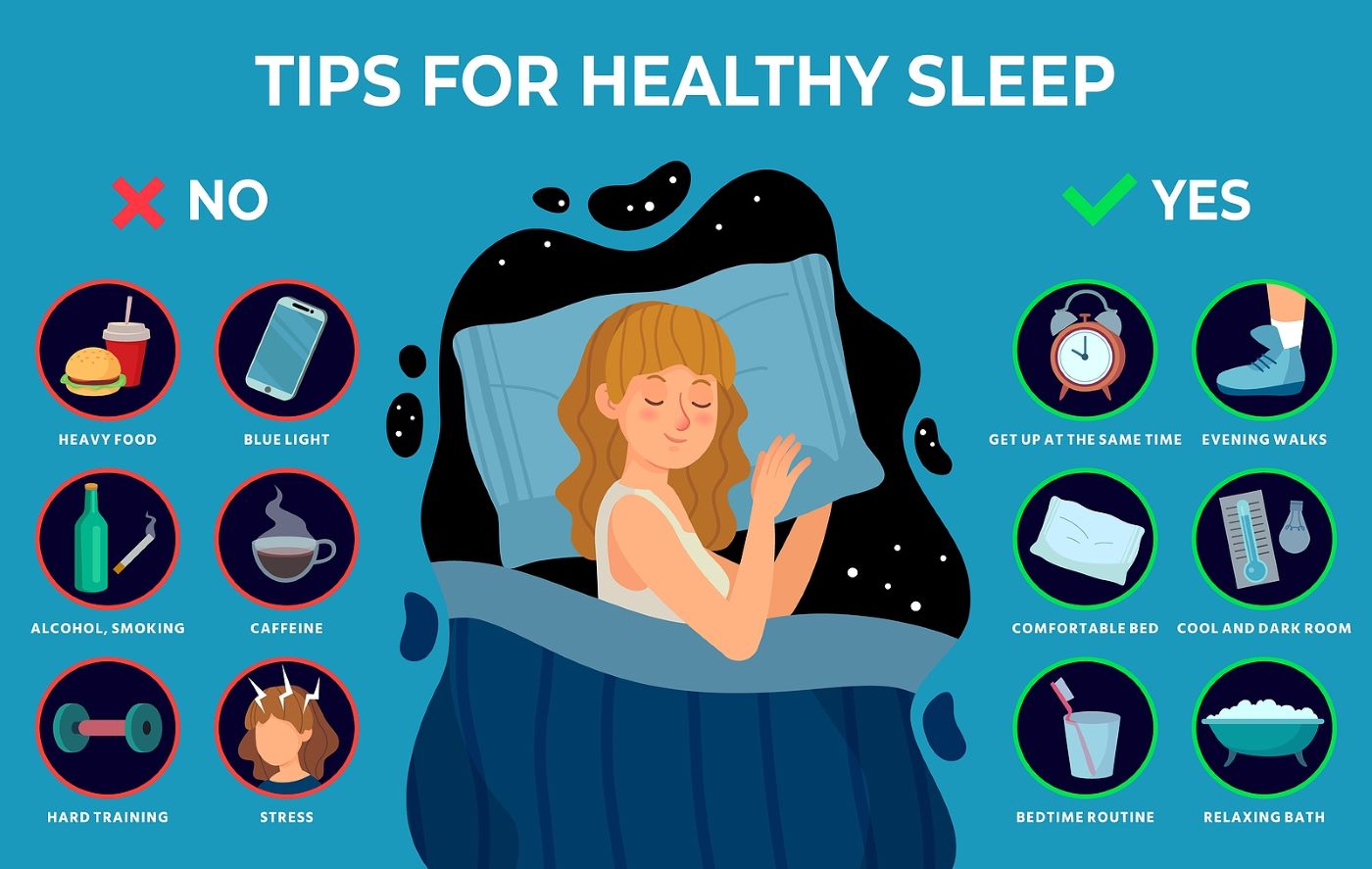Sleep Health: Understanding the Importance of Rest for Well-Being
Sleep is more than just a period of restit is a critical component of overall health and well-being. Getting quality sleep supports your physical, mental, and emotional health, affecting everything from your immune system to your cognitive performance. In todays fast-paced world, sleep health is often overlooked, leading to a range of issues, from chronic fatigue to serious health conditions.

What Is Sleep Health?
Sleep health refers to the quality, duration, and consistency of sleep that a person gets. Good sleep health is defined by getting an adequate amount of sleep that is restful, uninterrupted, and synchronized with your bodys natural sleep-wake cycles. But its not just about getting enough sleepthe quality of your sleep matters too.
There are three key components of sleep health:
– Sleep Duration: How many hours of sleep you get.
– Sleep Quality: Whether sleep is deep, restorative, and free from disturbances.
– Sleep Regularity: Keeping a consistent schedule, going to bed and waking up at the same times every day.
Incorporating these factors into your lifestyle is critical to improving overall health. You can explore more about sleep cycles and tips to improve sleep from the National Sleep Foundation.
Why Sleep Is Essential for Your Health
Sleeping well is crucial for numerous bodily functions. Sleep affects nearly every system in your body, playing a vital role in:
– Physical health: including your heart and immune system.
– Mental and emotional health: including memory, mood, and decision-making skills.
“Without proper sleep, the body cannot recover, and the brain cannot function at optimal levels.”
1. Physical Health
A good night’s sleep strengthens your immune system, helps regulate hormones, and aids in cell repair. Studies have shown that individuals who get sufficient sleep are less likely to develop chronic illnesses like heart disease, diabetes, and obesity.

Lack of sleep, on the other hand, can lead to:
– Increased risk of cardiovascular issues.
– Reduced metabolism and weight gain.
– Lower immune response, making it easier to get sick.
If youre looking for actionable tips on maintaining physical health through better sleep, check out the American Sleep Association.
2. Mental and Emotional Health
Sleep also plays a significant role in mental and emotional regulation. When you sleep, your brain processes emotions, memories, and thoughts. It strengthens connections, enhancing your ability to focus, make decisions, and manage stress.
- Improved mood: Quality sleep improves your emotional resilience, making it easier to cope with stress and anxiety.
- Memory consolidation: Sleep is when your brain stores and organizes memories, leading to better recall and cognitive performance.
Chronic sleep deprivation has been linked to mood disorders like depression and anxiety. Addressing sleep problems can be the key to improving your mental well-being. You can read more about how sleep affects mental health at Sleep Foundation.
How Much Sleep Do You Need?
Different age groups require varying amounts of sleep. Heres a quick breakdown of how much sleep is needed by age, based on research from the National Sleep Foundation.
1. Newborns to Teenagers
- Newborns (0-3 months): 14-17 hours per day.
- Infants (4-11 months): 12-15 hours per day.
- Toddlers (1-2 years): 11-14 hours per day.
- Preschoolers (3-5 years): 10-13 hours per day.
- School-age children (6-13 years): 9-11 hours per day.
- Teenagers (14-17 years): 8-10 hours per day.
2. Adults and Seniors
- Adults (18-64 years): 7-9 hours per night.
- Older adults (65+ years): 7-8 hours per night.
The quality of sleep is equally important, so even if you’re sleeping for 7-9 hours, if it’s disrupted, you won’t reap the benefits. Consistency is also key; maintaining the same sleep schedule on weekends as you do during the week helps improve your sleep quality.
Understanding Sleep Cycles
When you sleep, your body goes through multiple sleep cycles, each consisting of several stages. These cycles are critical for both physical recovery and mental clarity. Learning about your sleep cycle can help you understand why waking up during certain stages of sleep can make you feel groggy, while at other times you feel refreshed.

NREM (Non-Rapid Eye Movement) Sleep
NREM sleep has three stages, each progressively deeper:
1. Stage 1: Light sleep where you drift in and out of consciousness.
2. Stage 2: A deeper sleep where heart rate slows and body temperature drops.
3. Stage 3: The deepest sleep stage, also known as slow-wave sleep, which is crucial for physical recovery.
During NREM sleep, your body repairs tissue, builds muscle and bone, and strengthens the immune system.
REM (Rapid Eye Movement) Sleep
REM sleep is where most of your dreaming occurs. It is essential for memory consolidation and learning. During REM sleep, brain activity increases, similar to when youre awake, but your body enters a state of paralysis to prevent you from acting out your dreams.
- Cognitive functions such as problem-solving and creativity benefit from REM sleep.
- Skipping REM sleep can lead to mental fatigue, forgetfulness, and trouble concentrating.
You can find more information about sleep cycles and how they impact health on the Mayo Clinic.
Stay tuned for part two, where we will explore common sleep disorders, tips for better sleep, and the impact of stress on your sleep health. Implementing these habits can lead to long-term improvements in your sleep, mood, and overall health.
To improve your sleep habits today, check out this article on Creating a Sleep Routine for Better Health.

Continue reading part two for more actionable tips, and remember: prioritizing sleep is prioritizing your health.
Common Sleep Disorders
While many people struggle with poor sleep, the causes often go deeper than stress or lifestyle choices. Sleep disorders are medical conditions that can severely affect sleep quality and overall health. Identifying and addressing these conditions is crucial for improving sleep health.

1. Insomnia
Insomnia is one of the most common sleep disorders, affecting millions of people worldwide. Its characterized by difficulty falling asleep, staying asleep, or waking up too early and not being able to go back to sleep. Insomnia can be acute (short-term) or chronic (long-term), with many possible causes including stress, anxiety, and poor sleep habits.
- Symptoms of insomnia:
- Trouble falling asleep.
- Waking up frequently during the night.
- Feeling unrefreshed in the morning.
Chronic insomnia often requires treatment such as Cognitive Behavioral Therapy for Insomnia (CBT-I), a structured program that helps patients develop better sleep habits by changing behaviors and thoughts around sleep. For more information on insomnia treatments, visit the American Academy of Sleep Medicine.
2. Sleep Apnea
Sleep apnea is a serious sleep disorder where breathing repeatedly stops and starts throughout the night. The most common type, obstructive sleep apnea, occurs when throat muscles relax excessively during sleep, blocking airflow. This can lead to snoring, daytime fatigue, and even high blood pressure or heart disease if left untreated.
- Symptoms of sleep apnea:
- Loud snoring.
- Gasping for air during sleep.
- Excessive daytime sleepiness.
Treatment options range from Continuous Positive Airway Pressure (CPAP) devices to lifestyle changes and, in severe cases, surgery. Learn more about sleep apnea from the National Institutes of Health.
3. Restless Leg Syndrome (RLS)
Restless Leg Syndrome (RLS) is another condition that can significantly disrupt sleep. RLS causes uncomfortable sensations in the legs, such as tingling, crawling, or aching, leading to an uncontrollable urge to move them, especially at night. This constant movement can prevent deep, restful sleep.
- Symptoms of RLS:
- Unpleasant leg sensations at night.
- Difficulty falling and staying asleep.
- Daytime fatigue and irritability.
RLS can be managed with lifestyle changes, medications, and relaxation techniques. Learn more about RLS on the Mayo Clinic.
4. Narcolepsy
Narcolepsy is a neurological disorder that affects the brain’s ability to control sleep-wake cycles. People with narcolepsy often experience excessive daytime sleepiness and sudden sleep attacks, where they fall asleep unexpectedly. Narcolepsy can significantly affect daily life and may lead to other complications, including mental health issues.
- Symptoms of narcolepsy:
- Sudden bouts of sleep during the day.
- Cataplexy (loss of muscle control).
- Sleep paralysis.
Treatment options include medications and lifestyle adjustments. More information on narcolepsy can be found at the Sleep Foundation.
Tips for Better Sleep
Improving sleep health is achievable with a few simple but effective strategies. By adopting healthier sleep habits and creating the right environment for rest, you can dramatically improve your quality of sleep.

1. Stick to a Sleep Schedule
One of the most powerful changes you can make is to establish a consistent sleep schedule. Going to bed and waking up at the same time every day helps regulate your body’s internal clock, making it easier to fall asleep and wake up naturally.
- Try to maintain the same schedule even on weekends to avoid disrupting your bodys rhythm.
2. Create a Relaxing Bedtime Routine
Developing a pre-sleep routine can signal your body that its time to wind down. This could include activities such as:
– Reading a book.
– Listening to soft music.
– Practicing meditation or deep breathing exercises.
Avoid engaging in stressful or mentally stimulating activities before bed, as these can make it harder to fall asleep.
3. Optimize Your Sleep Environment
Your sleep environment plays a critical role in the quality of your sleep. Ensure that your bedroom is conducive to rest:
– Dark, cool, and quiet are ideal conditions.
– Invest in a comfortable mattress and pillows that provide adequate support.
– Consider using earplugs or a white noise machine if noise is an issue.
For more details on creating an optimal sleep environment, visit Sleep.org.
4. Limit Screen Time Before Bed
The blue light emitted by phones, tablets, and computers interferes with melatonin production, making it harder to fall asleep. Try to limit screen time at least an hour before bed, or use blue light filters or apps that reduce blue light exposure.
- You can also consider blue light-blocking glasses for those who work late or frequently use screens at night.
5. Watch Your Diet and Caffeine Intake
What you eat and drink can have a profound impact on your sleep. Avoid large meals, caffeine, and alcohol in the evening, as they can interfere with your ability to fall asleep.
- Caffeine can stay in your system for up to 8 hours, so try to avoid it after the afternoon.
- Eating a light snack before bed can help prevent hunger without disrupting sleep.
The Role of Technology in Sleep Health
With advances in technology, it’s easier than ever to monitor and improve your sleep patterns. Heres how technology can help enhance your sleep health.
1. Sleep Trackers
Devices like wearable sleep trackers and smartphone apps can monitor your sleep cycles, giving you insights into your sleep duration and quality. By analyzing this data, you can make adjustments to improve your sleep habits.
Some popular apps include:
– Fitbit for comprehensive sleep tracking.
– Sleep Cycle for gentle wake-up alarms based on your sleep stage.
2. Blue Light Filters and Apps
If you must use screens late at night, consider downloading blue light filter apps that reduce the amount of blue light emitted by your devices. These can help minimize the impact on your sleep.
Popular blue light filters include:
– F.lux for computers.
– Night Shift mode on iPhones.
The Impact of Stress on Sleep
Stress and anxiety are major contributors to sleep problems. When your mind is racing with worries or your body is tense, it can be difficult to relax and fall asleep. Managing stress is crucial for improving sleep health.
1. Meditation and Mindfulness
Practicing mindfulness or meditation before bed can help calm your mind and reduce anxiety. Techniques like deep breathing, progressive muscle relaxation, and guided imagery can help lower stress levels and prepare your body for sleep.
2. Cognitive Behavioral Therapy for Insomnia (CBT-I)
For chronic insomnia sufferers, Cognitive Behavioral Therapy for Insomnia (CBT-I) is a highly effective treatment. CBT-I works by changing negative thoughts and behaviors around sleep, helping individuals establish better sleep habits. It has been shown to be more effective than sleep medications in many cases.
Learn more about CBT-I from the National Sleep Foundation.
When to Seek Professional Help for Sleep Issues
If your sleep problems persist despite trying the above tips, it may be time to consult a sleep specialist. Here are some signs that indicate you should seek professional help:
- Chronic daytime fatigue despite sleeping 7-9 hours.
- Loud snoring or gasping for breath during sleep.
- Regular sleepwalking, night terrors, or other abnormal behaviors.
- Difficulty staying asleep or waking up frequently during the night.
A healthcare provider can assess your symptoms and recommend treatments or therapies tailored to your needs.
Conclusion: Prioritizing Sleep for Long-Term Health
Sleep health is essential for maintaining both physical and mental well-being. By adopting better sleep habits, managing stress, and addressing any underlying sleep disorders, you can vastly improve your quality of life.
“Good sleep is not a luxuryits a necessity.”
Take action today by implementing the tips outlined in this guide, and if necessary, seek professional help to ensure youre getting the rest your body needs to function at its best.
For more information on sleep health and resources for improving your sleep, visit the National Sleep Foundation.

FAQs
Q: What are the best sleep positions for a healthy back?
A: Sleeping on your back is often recommended for spinal health, as it helps maintain a neutral spine. However, side sleeping with a pillow between your knees can also be beneficial.
**Q: How do naps affect sleep health?
